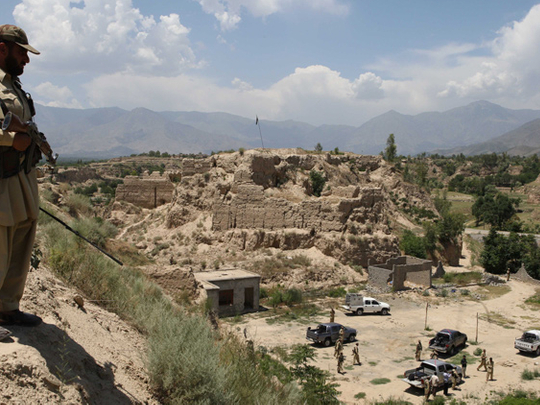
Islamabad The head of Tehreek-e-Taliban Pakistan’s (TTP) negotiating team on Monday reported “positive response” by the militant outfit to the government’s key demands made at the opening round of peace talks last week.
Maulana Samiul Haq however said he could not give details before conveying them to the four-member government negotiating team.
He was speaking to media at his seminary at Akora Khattak in northtwestern Khyber Pakthunkhwa province after the return of his two team colleagues from North Waziristan tribal are, where they held meetings with Taliban “shura” or council over the weekend.
Haq said his colleagues had also brought TTP’s demands, which he would convey duing the meeting with the government team.
Professor Ebrahim and Maulana Yousuf Shah had flown to the tribal area on Saturday aboard a government helicopter, which also brought them back.
“I can say the Taliban have given a positive and encouraging response to four government demands but I cannot disclose details right away,” Haq said. He appealed to all sections of society to pray for a successful outcome of the peace talks.
The talks got underway on Thursday when the committees appointed by the government and the TTP held an opening round in Islamabad.
According to a joint statement issued after the meeting, the government proposed that the peace talks aimed at ending the seven-year old Taliban insurgency should be held within the confines of the Pakistan constitution.
The government also proposed that scope of a peace deal will be limited to the insurgency-affected areas, all activities which may affect peace efforts should immediately be stopped and talks should be smoothly concluded in a short timeframe.
Meanwhile, the AFP, citing a militant source said on Monday that Taliban insurgents had set tough terms for peace talks with Pakistan’s government including the release of all imprisoned fighters and the withdrawal of troops from tribal areas.
A TTP commander said the prisoner and troops issues were a “test case” for the government of Prime Minister Nawaz Sharif to prove its sincerity.
“This is the first round of talks. The committee members will now meet the government committee and will forward our demands, they will meet us again with a reply,” the commander said.
“This is a war of years and years and one cannot solve it in minutes, nor can one disclose every detail of talks. We have a chance to stop the bloodshed,” said the chief negotiator representing the Taliban, Maulana Sami-ul-Haq.
Maulana Yousuf Shah, another member of the team, said that “five or six” US drones were in the sky at the time but the Taliban and the negotiation team had avoided them.
Pakistan’s military entered the tribal areas in 2003 after the US invasion in 2001 of Afghanistan, launching operations against homegrown militants and foreign fighters.
The withdrawal of troops and the release of prisoners are longstanding demands of the TTP.
The Taliban say they want security in the tribal areas taken out of the hands of the army and given to local security and administrative officials, a move which would strengthen the militants’ control.
The Taliban’s other demands included nationwide implementation of a strict form of Islamic sharia law and Islamic-based education at all levels, an end to Pakistan’s military support for the United States and a halt to drone strikes, and an end to interest-based banking.
There has been widespread scepticism about the chances of ending the TTP’s bloody insurgency, particularly since regional deals have quickly broken down in the past.












